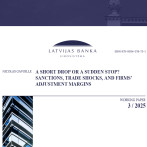Latvia's exports: no reason for much optimism, a zigzag path maintained
According to the data published by the Central Statistical Bureau of Latvia (CSB), Latvia's foreign trade turnover grew by 10.8% month-on-month in February 2016, at the same time contracting by 3.3% year-on-year. Although the export and import values of goods grew by 9.5% and 11.8% respectively in comparison with January, the annual growth rates for the trade in goods remained negative for the third consecutive month in February at –1.2% and –5.0% in the case of exports and imports respectively.
Exports of goods contracted by 6.1% in annual terms within the first two months of the year. The largest negative contributions were made by the exports of mechanical appliances and electrical equipment, mineral products, textiles and textile articles. The contributions of the exports of grain, wood, products of the chemical industry, optical instruments, medical equipment etc. as well as food products remained positive.
Looking by country, a fall in the exports of goods was reported to several Latvia's major trade partners in the reference period, including Lithuania, Estonia, Russia, Germany, Sweden and Poland. Positive annual growth was preserved in the first two months of the year in the case of the exports of goods to Denmark, Finland and the United Kingdom as well as to previously less traditional export markets: France, Bulgaria, Croatia, Ireland, Malta, Switzerland, Ukraine, Moldova, Turkmenistan, Uzbekistan, the United Arab Emirates, Philippines, Algeria, Ethiopia, Kenya, Morocco, Mauritania etc.
Imports of goods contracted by 8.5% in comparison with the first two months of the previous year primarily on account of the shrinking imports of mineral products, base metals, mechanical appliances and electrical equipment. This is related to the plummeting oil prices and the weakening demand for commodities and investment in manufacturing.
The euro area economy will continue to recover in the upcoming months, although, given the concerns regarding the global outlook and the slowdown of growth in the emerging economies, the pace of recovery will be slower than expected. China's economic growth also continues to decelerate, having a dampening effect on other emerging markets, particularly in Asia. Overproduction and build-up of inventories can be observed in several commodity segments of the global market (e.g. articles of base metals, oil, etc.), which, in combination with the weak global demand, continues to exert a downward pressure on the prices of those commodities.
On the one hand, the shrinking of prices allows importing economies like Latvia to reduce their current account deficits on account of cheaper imported manufacturing inputs. Consumers also benefit from this as lower transportation costs mean that they can afford to spend more on other goods and services, thereby boosting domestic consumption. On the other hand, countries that export natural resources and commodities need to adapt to the low commodity prices, which, in turn, decreases their economic activity. Meanwhile, the weakening of the external environment and the demand from trade partners can have a negative effect on the future development of Latvia's manufacturing sector and exports of goods.
Nevertheless, regardless of the sluggish demand and the challenges faced by several sectors, Latvia's businesses still have a growth potential in quite a few sectors. For instance, wood industry undergoing quality changes in the recent years has proved that it is able sustain the exports of wood by increasingly more often transforming their outputs into higher added value articles, despite the low activity in the construction sectors of some European Union (EU) member states (Germany, United Kingdom).
Latvia's agricultural and food products sector has also been able to preserve its export capacity. In light of the ecological, environmental and quality problems faced by the industrial economies, consumers worldwide have a growing tendency to turn to a healthy lifestyle. Therefore, the role of quality in food production is becoming more important year by year and Latvia's businesses are able to offer organic, ecological and top quality products. Although most of our food producers lack output capacity to export sufficient amounts of products for mass consumption to big markets, one of the ways to penetrate export markets is specialising in innovative products and creating new niche products. Consumers want to be aware of the contents and ingredients of particular products and the risks to health posed by the particular food products; thus it is vital for the products to remain natural and healthy. Although ecologically clean food is quite expensive, the market for such food is growing by up to 10%–5% every year*. Latvia is well-positioned to benefit from this tendency, as we have access to top quality inputs required for food production and organic food has a high export potential.
In order to be able to increase the volume of exports in the future, the ability of businesses to achieve productivity gains through the improvement of human capital and technologies is essential. Increasing output volumes and competitiveness requires investment, the absence of which can significantly weaken Latvia's economic growth prospects. Effective reforms, a sound tax policy ensuring better business environment rather than weakening the competitiveness of the economy as well as a strategic educational policy all are prerequisites for investment growth.
*European Commission, Agriculture and Rural Development, Agricultural Market Briefs http://ec.europa.eu/agriculture/markets-and-prices/market-briefs/index_en.htm
Textual error
«… …»






